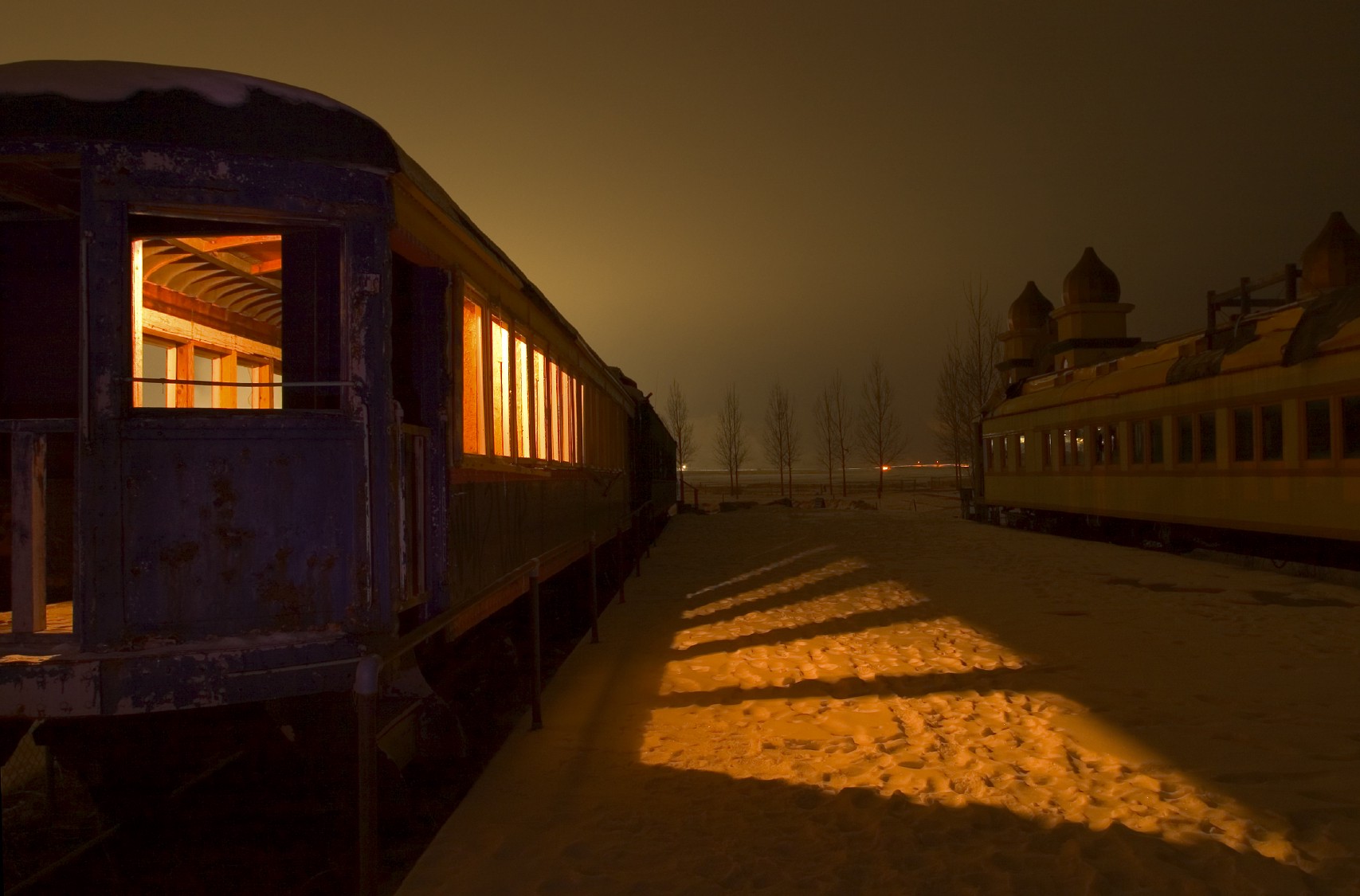
Three days before Christmas we’re riding the night train to Chicago through Michigan’s wintry darkness. From a high enough vantage point over the continent you’d see a flurry of motion, as dispersed individuals are drawn to the strange attractors known as home. Down here we just see tired faces.
There is a particular strain of fatigue which we’ve been collecting for almost a year, and now this exhaustion surfaces as we approach the one place we can safely unload it. When we arrive we’ll smile weakly and attribute our fatigue to the trip itself. Maybe, having unburdened it, we’ll revive in time to enjoy one another’s company.
We bought magazines at the station news-stand, glossies we never read at home because it would be too indulgent. Travel is a license to buy them; their brilliant evocations of lives we’ll never lead are all the more tantalizing when we’re in transit. In transit, between poles, we exist in a realm of possibility, and for the duration of the trip those brilliant lives are just a bit closer.
But after seven hours we’ve exhausted those fantasies, we’ve run short of conversation, we are too restless to sleep. We can no longer postpone our engagement with the darkness outside the window. So we stare out. Our eyes lock on to the most unpromising objects and surrender them reluctantly as the train carries us along. We pass farms, black expanses of soil or thin white sheets of tattered snow, fields bristling with snapped cornstalks, brown, raspy and stiff. Houses with one or two lights burning.
The warmth of these solitary homes awakens a yearning for the hearth in us transients who observe them. The lighted windows of this train, rumbling through the night with its dolorous whistle, dredge complementary reveries of escape in those rooted souls whose silhouettes we glimpse, wavering in parlour windows.
Towards 10 p.m. snow begins to fall; dry flakes collide with the window and vanish. The train slows down, entering the outskirts of a small industrial town, then stops at a station. A half dozen people stamping their feet, waiting. Dim bluish light refrigerates the concrete platform. We’re relieved when, only moments after stopping, a whistle blows and the train lurches forward, relieved to depart so promptly from this cold nameless place.
Then two figures appear on the platform, running flat out, fast enough that they draw abreast my berth on the slowly accelerating train. A small woman trailing a scarf and a purse and holding three or four bulging bags of Christmas shopping in one hand, a younger and much larger man cradling what appears to be a cage as he runs. No, something you’d find in a cage. A hamster’s exercise wheel? I can’t tell.
At this first hint of drama in 500 miles of travel I sit up straight. But this is nameless Michigan not Paris or Rome and they’re dressed in puffy, shapeless parkas and wearing clumsy snow boots — I can attach no intrigue, no romance, no mystery to their urgency, and I frankly hope the train doesn’t stop for them.
But I realize that they’re not trying to board the train. The woman is shouting and gesturing frantically and clutching at the lumbering young man’s arm; her movements are plain enough that I can supply the words I can’t hear: “Get down! Get down!” A glimpse of him in the grainy night — a moon-faced man-child, panic dimly lighting his sluggish eyes. He stumbles with bullish determination towards the train before yielding to the woman’s urgings.
And then he suddenly drops to the ground. He settles cross-legged on the concrete and sets the shiny wire wheel before him, and starts rocking convulsively, back and forth, his mouth stretched wide open like a squalling infant and his eyes rolling up in his head. And he begins spinning the wheel — is it really just a hamster wheel? — spinning it as fast as he can, the river of his fingers splashing over it in a blur.
The train accelerates and draws away. I press my cheek against the cold glass, watching the man-child toss himself back and forth as long as I can. Light catches on the chrome wires of his spinning wheel, blinks into obscurity.
What was that, we ask each other. What was he doing? I half-stand but nobody else in the coach seems to have noticed, or if they noticed they weren’t as unsettled as I am. By the rites of a lumbering man-child. Worshipping the steely behemoth which rumbles and howls through his night with ominous regularity? Blessing the souls imprisoned in these coaches, roaring and squealing from the sanctuary of his world into wintry black oblivion? Or warding off the energies that stream from this train, despair audible in the diminishing whine of its whistle, visible in the slack incurious faces pressed against windows, in all those heads sagging in half-sleep or bent towards the tired newspapers in their laps.
Behind him the older woman, probably his mother, stood with one hand on his shoulder, now calm and patient. If she was ever disturbed by her boy’s feverish ritual, the feeling had long ago yielded to resignation. No, she’d gone past even that: she participated, she encouraged, she coached, and then she waited, her only visible attitude one of simple, pragmatic relief that they didn’t miss the ten o’clock train.
You just do what you’ve got to do, I imagine her saying. He just does what he has to do to keep things running in his world.


